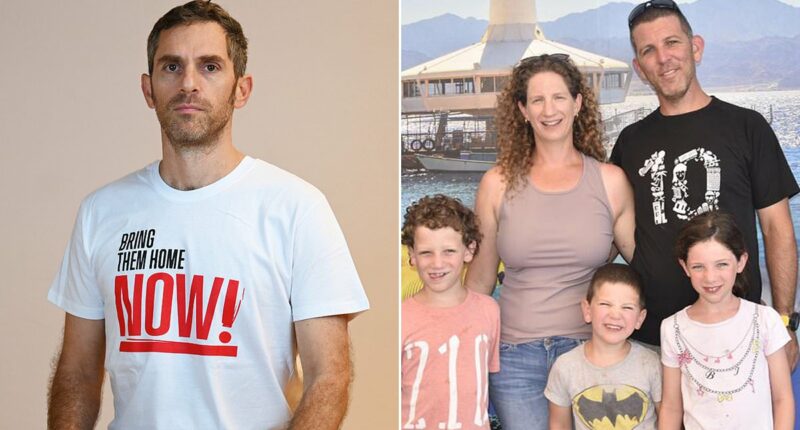Share this @internewscast.com
While others chose to run, Tal Haimi, a father of four, decided to stay back and defend his family’s kibbutz when Hamas militants attacked on October 7, 2023.
‘He wasn’t taken while hiding,’ said Udi Goren, Haimi’s cousin. ‘He was fighting to protect others.’
Haimi—a member of a rapid response local security force—was killed and his body dragged into Gaza. His family didn’t learn of his death until two months later, when the IDF confirmed the horrific news.
‘It was heartbreaking,’ he said sadly.
More than two years after Hamas kidnapped 251 people from Israel, 48 hostages remain outstanding, with at least 20 believed to be alive at this time.
President Trump is set to arrive in Israel on Monday morning and address the Knesset, making a quick visit to mark the ceasefire deal he helped broker. The president said hostages would be released on Monday or Tuesday.
For Gorin, the stakes aren’t abstract: The struggle is about recovering his family member’s body — a painful task made more difficult by reports that some bodies may not be returned under the proposed ceasefire deal.

For his cousin, the loss isn’t abstract: it’s raw, unresolved and it drives every plea, protest and negotiation he now leads on behalf of other hostage families

41–year–old civil engineer Tal Haimi, was defending their kibbutz, Nir Yitzhak, when Hamas militants attacked. Haimi was killed that day, and the family was later told of his death

Udi Goren says he was at a delegation to the EU when Haimi’s uncle called him, letting him know that the IDF confirmed he was murdered

For hostage families like Goren’s, each day without clarity or movement only reinforces the dread that promises could be delayed or broken

His widow is now raising four children on her own. ‘She’s incredibly strong,’ Goren said. ‘She’s focused on the kids. But they all need closure’

‘For two years, we’ve lived with this,’ said Goren, who has become a leading voice in the Hostage Families Forum. ‘His wife, his kids… they just need to know he’s home. They need a grave to visit. That’s the bare minimum’
‘For two years, we’ve lived with this,’ said Goren, who has become a leading voice in the Hostage Families Forum. ‘His wife, his kids… they just need to know he’s home. They need a grave to visit. That’s the bare minimum.’
Haimi’s widow is now raising four children alone. ‘She’s incredibly strong,’ Goren said. ‘She’s focused on the kids. But they all need closure.’
Now, with a fragile ceasefire in place, Haimi’s family watches with guarded hope—and deep dread.
A 72–hour truce began with Israeli forces pulling back to new positions in Gaza. By Monday’s deadline, hostages—living and dead—are set to be released alongside nearly 2,000 Palestinian prisoners.
But for Goren, promises mean nothing until bodies come home.
‘We’ve been told before that a deal was close. Twice in the past six months alone,’ he said. ‘And then it fell through. It’s not real until we see people coming home.’
The fear that Hamas won’t honor the agreement haunts him. Whether both sides will adhere to the timeline, guarantee safe passage, and fulfill all conditions remains uncertain—and lives hang in the balance.
‘I am very anxious about Hamas not holding up their end of the deal,’ Goren said.

Goren has traveled as part of international delegations to keep pressure on world leaders. He visited New York last September and continues to work with families of other hostages

Of the 48 hostages named in the current agreement, only 20 are believed to be alive

Asked what he would say to his cousin today, Goren paused. ‘He should be proud of his family,’ he said quietly. ‘Of his wife, of his children, of how they’ve carried on. That’s what I would tell him’
For Goren and Haimi’s family, each day without movement only deepens the dread that this deal, like others before it, could collapse.
‘If they can’t find all the murdered hostages in the 72–hour window, what happens?’ Goren asked. ‘Do we abandon the deal? Do we give up? That’s terrifying.’
Goren and Haimi were born just months apart.
Raised in different parts of Israel, Goren in the city, Haimi in the kibbutz –– they remained close throughout their lives. ‘He was gentle, a problem solver, deeply devoted to his family,’ Goren recalled. ‘And on that day, he did what he always did — he stepped up.’
As public opinion around the conflict remains deeply polarized, Goren offers a broader perspective.
‘A lot of people think they have to pick a side — Israel or Palestine,’ he said. ‘But the real divide is between those who want a peaceful resolution and those who don’t.’
He emphasized that this deal is not just about Israel or Gaza — it’s about ending human suffering on both sides.
‘You don’t have to support Israel. You don’t have to support Hamas. Just support this deal,’ he said. ‘Support bringing the hostages home. Support stopping the killing. That’s what matters.’
Asked what he would say to his cousin today, Goren paused.
‘He should be proud of his family,’ he said quietly. ‘Of his wife, of his children, of how they’ve carried on. That’s what I would tell him.’









